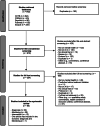Artificial intelligence in mental health care: a systematic review of diagnosis, monitoring, and intervention applications
- PMID: 39911020
- PMCID: PMC12017374
- DOI: 10.1017/S0033291724003295
Artificial intelligence in mental health care: a systematic review of diagnosis, monitoring, and intervention applications
Abstract
Artificial intelligence (AI) has been recently applied to different mental health illnesses and healthcare domains. This systematic review presents the application of AI in mental health in the domains of diagnosis, monitoring, and intervention. A database search (CCTR, CINAHL, PsycINFO, PubMed, and Scopus) was conducted from inception to February 2024, and a total of 85 relevant studies were included according to preestablished inclusion criteria. The AI methods most frequently used were support vector machine and random forest for diagnosis, machine learning for monitoring, and AI chatbot for intervention. AI tools appeared to be accurate in detecting, classifying, and predicting the risk of mental health conditions as well as predicting treatment response and monitoring the ongoing prognosis of mental health disorders. Future directions should focus on developing more diverse and robust datasets and on enhancing the transparency and interpretability of AI models to improve clinical practice.
Keywords: artificial intelligence; chatbot; machine learning; mental health.
Conflict of interest statement
The authors have no conflicts of interest to declare.
Figures
References
-
- Amminger, G. P., Mechelli, A., Rice, S., Kim, S.-W., Klier, C. M., McNamara, R. K., Schäfer, M. R. (2015). Predictors of treatment response in young people at ultra-high risk for psychosis who received long-chain omega-3 fatty acids. Translational Psychiatry, 5(1), e495–e495. 10.1038/tp.2014.134 - DOI - PMC - PubMed
Publication types
MeSH terms
LinkOut - more resources
Full Text Sources
Medical


